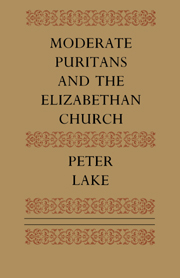Book contents
- Frontmatter
- Contents
- Dedication
- Preface
- 1 Introduction: Laurence Chaderton and the problem of puritanism
- 2 Moderate beginnings: the case of Edward Dering
- 3 Chaderton's puritanism
- 4 The moderate puritan divine as anti-papal polemicist
- 5 Thomas Cartwright: the search for the centre and the threat of separation
- 6 William Whitaker's position as refracted through his anti-papal polemic
- 7 Theory into practice: puritan practical divinity in the 1580s and 1590s
- 8 William Whitaker at St John's: the puritan scholar as administrator
- 9 The theological disputes of the 1590s
- 10 Conformity: Chaderton's response to the Hampton Court Conference
- 11 William Bradshaw: moderation in extremity
- 12 Conclusion
- Notes
- Bibliography
- Index
- Frontmatter
- Contents
- Dedication
- Preface
- 1 Introduction: Laurence Chaderton and the problem of puritanism
- 2 Moderate beginnings: the case of Edward Dering
- 3 Chaderton's puritanism
- 4 The moderate puritan divine as anti-papal polemicist
- 5 Thomas Cartwright: the search for the centre and the threat of separation
- 6 William Whitaker's position as refracted through his anti-papal polemic
- 7 Theory into practice: puritan practical divinity in the 1580s and 1590s
- 8 William Whitaker at St John's: the puritan scholar as administrator
- 9 The theological disputes of the 1590s
- 10 Conformity: Chaderton's response to the Hampton Court Conference
- 11 William Bradshaw: moderation in extremity
- 12 Conclusion
- Notes
- Bibliography
- Index
Summary
This study has tried to trace the outline of a certain evangelical protestant world-view. It was a world-view which united presbyterians like Chaderton with non-presbyterians like Whitaker and, later, establishment moderates like Chaderton with young firebrands like William Bradshaw. On a personal level it was this world-view that held together the various roles – scholar, preacher, theologian, puritan polemicist, administrator – that made up the career of men such as Chaderton, Cartwright or Whitaker. More generally, it served to unite many puritans with the more zealously protestant of the Elizabethan bishops.
The core of this world-view was provided by an all-encompassing concern with the potentially transforming effects of the gospel on both individuals and on the social order as a whole. The gospel, in the form of the word preached, was to be spread by university-trained divines like Chaderton and his pupils at Christ's and Emmanuel. The doctrinal position that lay behind this attitude was uncompromisingly Calvinist.
Thus far, then, the findings of this study might be taken to accord with much recent research which has tended to argue ‘puritanism’, conceived as a coherent or self-conscious body of opinion, out of existence. It has been replaced, as the central theme in the religious history of the period, by an emphasis on a basic protestant consensus of precisely the sort described above.
- Type
- Chapter
- Information
- Moderate Puritans and the Elizabethan Church , pp. 279 - 292Publisher: Cambridge University PressPrint publication year: 1982



